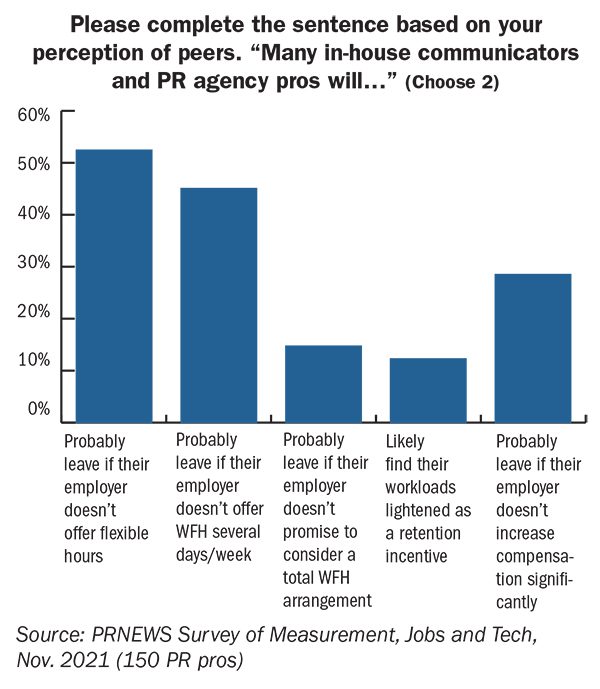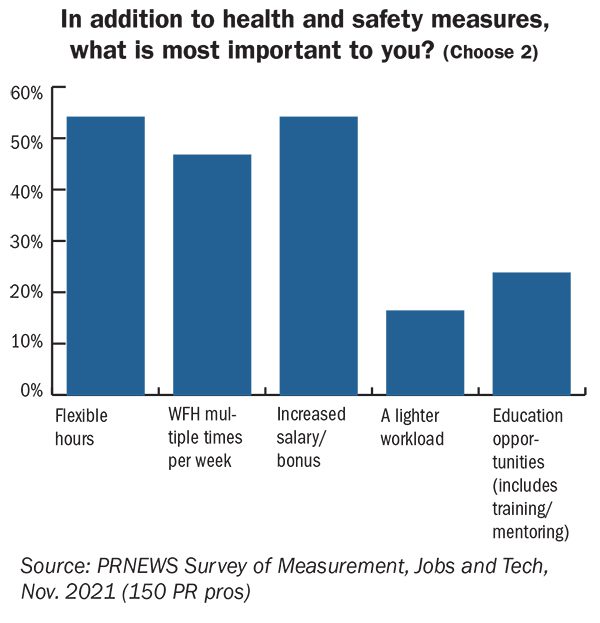
Recruitment and retention of top talent was an issue for PR long before the pandemic struck. For years, firms and in-house teams competed for employees using salary, upward mobility, health benefits and other perks, such as paid time off and summer Fridays.
Things are different now.
The shared pause from the coronavirus and WFH and, in some cases, death of friends and family, led communicators (and people in many other sectors) to reassess their professional and personal lives. This shared experience, in turn, pushed people toward pandemic epiphanies, according to Dr. Anthony Klotz, the Texas A&M professor who anticipated and dubbed the summer 2021 job exodus ‘The Great Resignation.’ In August, 4.3 million U.S. workers resigned.
In addition to, or because of, pandemic epiphanies, the work paradigm is slowly moving away from the employee-as-servant model. Companies, including those in the communication sector or employing PR pros in-house, are feeling pressure to respond to staff desires for flexible schedules, salary increases, and transportation and childcare benefits, among other things.
Looking at U.S. workers overall, the link between WFH and retention stands out, though just 13 percent were still WFH in August 2021. Still, one survey found 74 percent of workers saying that a WFH option would make them less likely to leave their jobs. And 64 percent of recruiters say WFH options help them find high-quality candidates.
Narrowing our view to PR pros, the trio of flexible hours, WFH options and better salaries dominated the new PRNEWS survey of 150 communicators. Factors such as a lighter workload (16 percent) and education/training/mentoring opportunities (24 percent) trailed significantly ( see charts).


In addition, the survey found 52 percent believe their fellow PR pros will leave if their employer fails to offer flexible hours. 45 percent say liberal WFH is a must.
“People like working from home. Forcing them back to the office is not a good move,” says Jody Johnson, a veteran HR executive who’s now Clarity PR’s head of people and culture.
Flexibility is Key
Clearly, PR needs to do something, or many things, to try to counter The Great Resignation. As surveys show, flexible schedules, WFH options and salary increases are table stakes. As a result, firms that want to remain relevant in the talent battles are looking beyond these three factors.
Unfortunately, few in the PR space can make a move like the one Sara Blakely, founder of Spanx, made late last month. To celebrate the 20-year-old company’s valuation and her sale of a majority stake for $1.2 billion, she gave every employee a first-class ticket to anywhere and $10K to spend on the trip.
Closer to home (no pun intended) and more relatable is the paid, 5-week sabbatical that healthcare innovation and marketing firm Real Chemistry awards employees after just 5 years on the job. Moreover, Real Chemistry urges sabbatical takers to go full bore. It advises they halt checking corporate email during the sabbatical.
Helping at All Stages of a Career
Clarity’s Johnson believes helping employees at all stages of their careers is key. This means PR employers should consider issues such as childcare and college loans, as well as being flexible with employees who are caring for elderly parents, she says.
For Ashish Kaushal, CEO of HireTalent and co-founder at Consciously Unbiased, a DEI training firm, flexibility and caring for employees throughout their careers means considering financial help for staff facing the costs of caring for elderly parents.
Admittedly, such benefits may come eventually. For now, flexibility most often means PR companies are adopting or considering hybrid work, flexible hours and options such as unlimited unpaid and paid time off.
Clarity, for example, is experimenting with an arrangement where staff report to the office for two core days weekly. Those days are devoted to “soft work,” such as ideation, networking, team building and one-on-ones with managers. (“People don’t quit companies; they quit their managers,” Johnson says. As such, she advocates for manager training.)
Still, acknowledging the need for flexibility and “everyone’s different experiences with COVID,” Johnson says that Clarity is offering the core days option, not mandating it.
Says Kaushal, “There has to be...the ability for people to work in a way that is best for their personal and professional needs.”
Adds Johnson, “The days of VPs being the only people allowed to [WFH] are over.” Kaushal concurs, adding that “there must be consistency,” in that leaders who mandate staff be present in the office must be there themselves. “Leaders need to manage people how they want to be managed.”
This includes inclusion and diversity, which can get lost with remote work, Kaushal notes. He recommends intentionally carving out time to connect with staff beyond work projects, “and to make sure everyone’s voice and perspectives are heard.” In addition, he likes starting Zoom calls by asking everyone the same question to allow talk time for all; or rotating who leads the team meeting.
The Whole Employee
Johnson also advocates taking care of “the whole PR employee,” not just the part that works 8 hours per day for years doing a job that’s consistently rated as one of the most stressful.
An example is a virtual job fair that 10 PR firms will offer later this week for Texas staff seeking to relocate as a result of that state’s abortion ban.
Another example is an approach to whole care from SourceCode Communications. Launched in September, SourceCode Strong offers a $1,500 annual personal development stipend, a yearly $900 mental wellness stipend, access to online therapy service TalkSpace, quarterly meditation sessions, fitness challenges, and 2 Nope Days yearly.
The firm describes Nope Days as “those mornings you wake up and simply cannot function.”
Speaking for the industry, co-founder Becky Honeyman admits, “We all have more we can be doing to support our employees during these challenging times.”
Kaushal advocates a simple tactic for 24-hour employee care. “Leadership needs to be clearer about expectations surrounding communication, such as letting employees know they are not expected to respond to Slack messages sent after 7pm or to emails over the weekend.”
An Issue of Culture
Beyond individual benefits and activities, though, Johnson sees recruitment and retention as an overarching issue of corporate culture. Companies employing PR pros that have built “a culture of trust and caring” will have an advantage in recruitment and retention, she says.
“When I started my career, it was only the financial department” that calculated benefits and care for employees, Johnson says. For PR firms to compete, she believes, that must change. Prospective and current employees want obvious benefits, such as healthcare and retirement, but also things that “surprise and delight,” such as half days on Fridays, for example.
Still, companies must be authentic, she counsels.
“PR people see through gimmicks...the whole ‘We’ll give you X amount of dollars to sign’ isn’t progressive, it’s desperation,” Johnson says.
One of Clarity’s more innovative moves is a benefit that allows its staff to participate in a trial of Mirza, a software tool that helps plan for the financial burden of raising children, for example. In addition to estimating, by zip code, childcare costs, Mirza also provides information about benefits, such as Health Savings Accounts, 401K plans and Flexible Spending Accounts, which can ease financial burdens.
“People tend to overlook benefits...there’s a lot of money left on the table,” Johnson says.
With the cost of raising a child in the U.S. estimated in 2020 at $233,610, and the career burnout rate for women rising significantly during the pandemic, couples should find Mirza’s financial information useful as they construct their child-raising plans.
In addition, while younger employees are more apt to use the tool, Johnson notes older employees considering adoption, or helping relatives with research on such issues, also can use Mirza.
Moreover, it’s a win-win. The company building Mirza is a Clarity client.
